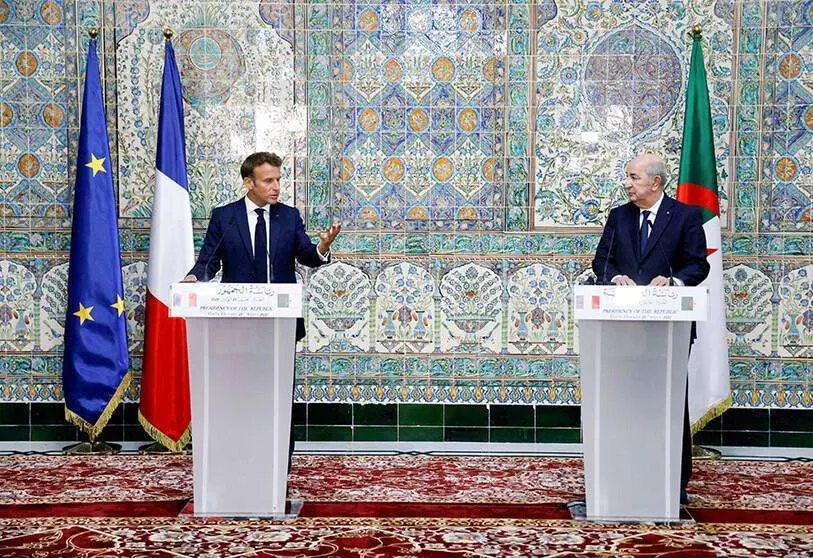Le Monde and Censorship: Macron, Algeria and the "right-wing stance" on Post-Colonial Act of Memory

It's a classic: censorship always produces the opposite of what it intends to achive. Le Monde has not strayed from the rule in unpublishing Paul Max Morin's column, "Reducing French Colonization in Algeria to a Love Story Completes Emmanuel Macron's Shift to a Right-wing Approach to the Question of Memory. By banning it, Le Monde has simply propelled a simple article, which could have gone unnoticed, to the rank of the most read, and has by the same token, given it an unexpected "posthumous life". Harsh criticism of Le Monde’s decision from famous opinion leaders only amplified the trend.
Edwy Plenel, journalist, political blogger and former Trotskyist militant, spoke in a tweet of "shocking censorship" when he deplored that Le Monde "apologized to the President of the Republic by deleting the article... which criticizes the Macronian vision of Franco-Algerian relations as "a love story that has its own share of tragedy".
The tweet from the famous economist Thomas Piketty is as blunt as it is direct: "Inexplicable and inexcusable censorship by the newspaper Le Monde. One can disagree with the article, but not suppress it because it displeases the Elysée". Henri Maler, professor and political activist and co-founder of the association Acrimed, protested by tweeting "Le Monde censors a column because it displeases Emmanuel Macron. What a servility!"
Jean-Luc Mélenchon vowed not to buy any more Le Monde: "Withdrawing an article because of a reference to Macron that displeases the latter! A new stage in the crumbling of a press that was once a reference. Le Monde misquotes all year round. But when Macron frowns.... I will not buy this paper next week. Do better".
What was it about Paul Max Morin's article that annoyed the Elysée to put pressure on Le Monde to withdraw the article on the "’rightwinging’ of the commemorative question" in the French-Algerian post-colonial context? Firstly, Le Monde's excuse for censorship: "Although it may be subject to various interpretations, the phrase "a love story that has its share of tragedy" uttered by Emmanuel Macron during the press conference did not specifically evoke colonization, as was mentioned on the opinion piece, but former Franco-Algerian relations". Evoking 'the tragic' in the post-colonial context as an effect of relations between countries is politically correct (according to Le Monde and Macron), but as a connotation of the trauma linked to colonization it is a rhetorical device that raises the question of memory and historical responsibility, issues that can infuriate, especially at the level of the French Right.
This is exactly the meaning of Paul Max Morin's text. For him, the question of 'memory' served as window dressing to 'simulate progress towards a reconciliation' that did not take place. What may have disturbed in his article is what he describes as a deliberate shift in Macron's discourses, from the recognition of colonialism as a crime against humanity (in 2017) to "a love story that has its tragic side" (in 2022). For Morin, the transformation is a rectification of the question of memory, as the recognition of the tragedies of colonization is a matter of political choice for the Left in France, while the vision of the colonial empire as a source of good and civilization, despite its setbacks, is a favored vision in rightwing circles.
The Elysée may be angry at the perception of a shift to the Right epically that it had commissioned a whole project of historiographical work on memory in collaboration with the historian Benjamin Stora. But the public and political actions surrounding Macron's visit to Algiers in late August 2022 show that Morin is probably not entirely wrong. The French president conveyed a message of hope, of a common future built in partnership with the youth of Algiers and Oran, a hope that refers to this love story that has its owns problems like any love story. A gentle, magnanimous, carefree reconciliation, looking to the future and not to the past. Instead of memory, we talk about the lovers' quarrels, their little stories, the small tragedies of separations limited in time…
This is why it was necessary to intervene and reframe (and censor) when Morin put his finger on the problem. The editors of Le Monde explained that when Macron speaks of a love impregnated with a tragic side, he is not referring to the period of colonization, but to the relationship between the two countries. The message is clear: there is no regression or shift to the Right.
In fact, the French President would like to overcome the traumas of the painful past of colonization, but without giving it a Left or Right wing color; vacillating between the traumas of memory and the oxymoron of love colored by tragedy. This ideological distinction becomes an effect of chronology. This is why the Elysée and Le Monde speak of the distinction to be made between "colonization", on the one hand, and "the long Franco-Algerian relationship", on the other.
Does the polysemic risk of Macron's phrase, "a love story that has its own share of tragedy", deserve the hammer of censorship? Is Paul Max Morin's interpretation of the question of "memory" as a "right-wing" issue so irrefutable as to deserve to be censored? Why muzzle debate on a subject as profound as it is topical? The truth is that Le Monde, which has forged a reputation on lecturing on human rights, did not hesitate to unpublish a simple opinion piece that did not please the Elysée.
When we spend our time counting the sins of others, the real test of our righteousness is when it comes to sweeping our own backyard.

